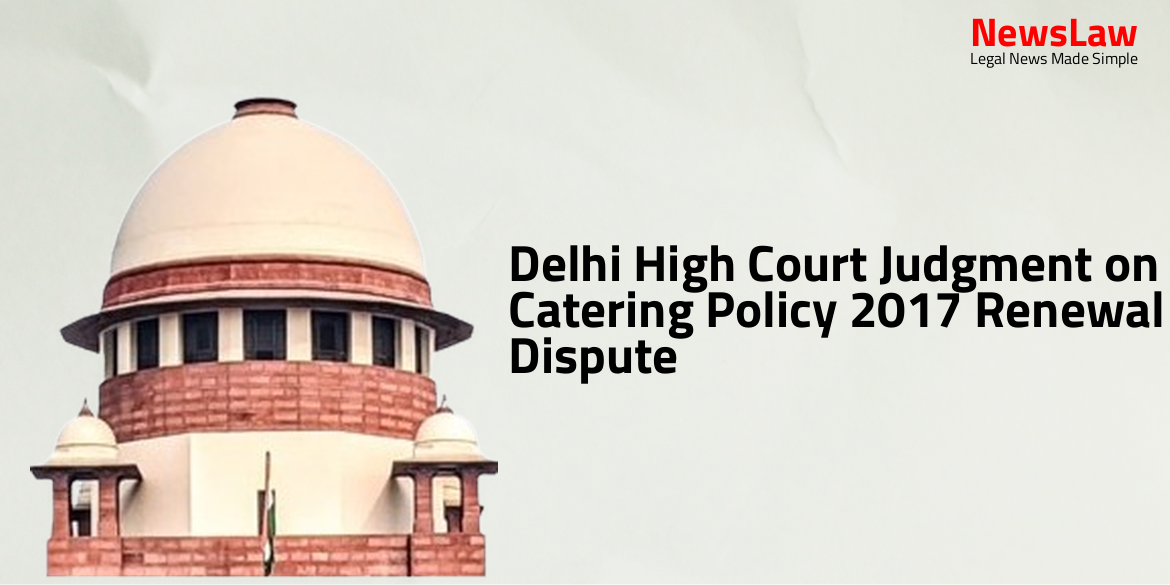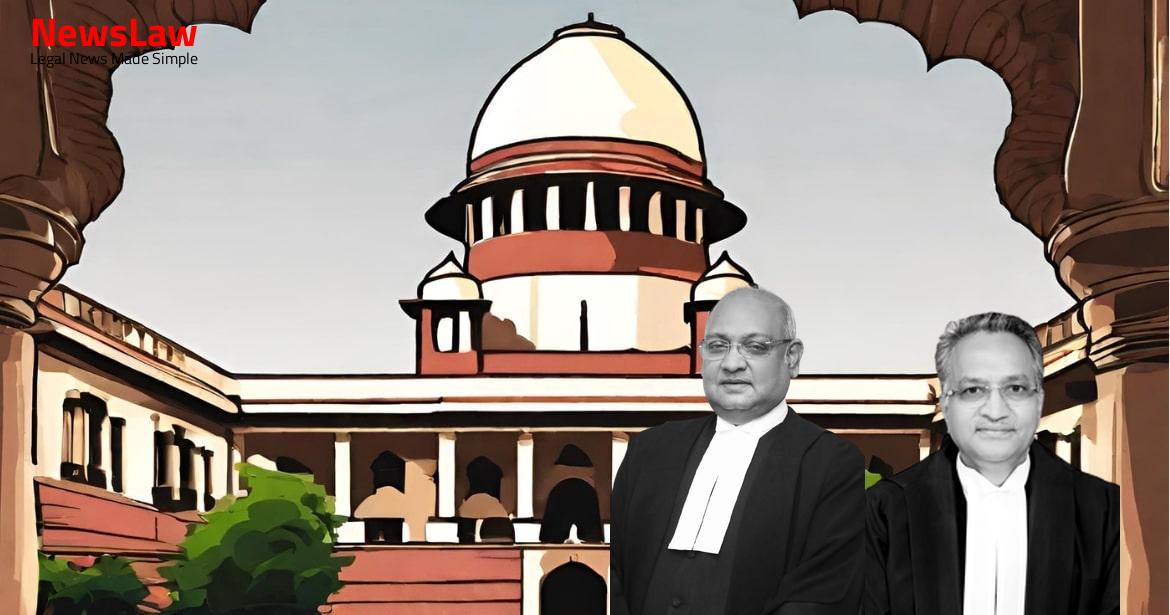In a landmark ruling by the Delhi High Court, a judgment on the renewal dispute under the Catering Policy 2017 has been pronounced. This case involves various parties affected by the policy, aiming to receive clarity and justice. The court’s decision holds significance for the involved parties and sets a precedent for similar cases in the future.
Arguments
- Petitioners cannot claim any benefit from the letter dated 21.05.2019.
- Even if a small part of the cause of action arises in Delhi, it does not compel the court to decide on the merits.
- The licenses for reserved and general categories are re-tendered accordingly.
- The license agreements and Catering Policy 2017 contain an arbitration clause.
- The respondents’ actions are deemed arbitrary and violative of Article 14 of the Constitution.
- The petitioners were well aware of the terms and conditions during the bidding process.
- Petitioners benefited from the Catering Policy 2017’s five-year tenure and cannot contest it now.
- Petitioners are accused of seeking perpetual license extension after availing policy benefits.
- Petitioners cannot take inconsistent positions.
- Coercion and duress allegations are deemed vague without specific instances.
- The Catering Policy 2017 prohibits license renewals or extensions as stated clearly.
- The policy aims to balance livelihood rights and equal opportunities as per the Supreme Court.
- Delhi’s Railway Board site alone does not confer jurisdiction to the court.
- The policy appears to violate Constitutional Articles 38, 39, and 41 as claimed.
- It prevents license monopolization and offers similar opportunities during re-tendering.
- All license agreements specify exclusive jurisdiction clauses elsewhere.
- Petitioners should approach courts most proximately connected to their disputes per convenience forum principles.
- Renewal of licenses for similarly situated individuals per Supreme Court directions is highlighted.
- There is no fundamental right to trade at specific public spaces, subject to reasonable restrictions.
- The petitioners’ licenses fall under the 2017 Policy’s governance.
- Differential treatment during license extension amid COVID-19 pandemic is questioned.
- Reference to various legal cases to support contentions.
- Clarifications on the letter from 13.12.2021 regarding existing minor catering units.
- Coercion and economic duress are cited as reasons for executing the license agreements.
Analysis
- The jurisdiction of the Court to entertain the writ petitions challenging Clause 11 of the Catering Policy 2017 is discussed.
- The Court considers the territorial jurisdiction based on the location of the authority to whom the writ is to be issued.
- The Court emphasizes that it is not within the domain of the courts to legislate but can determine the constitutionality of laws.
- Reference is made to a judgment regarding the period of non-operation of contracts and the restoration of passenger traffic at specific stations.
- The Court examines the impact of the Force Majeure clause implementation due to the lockdown on catering and vending contracts.
- The renewal and extension of licenses by the railways are discussed, emphasizing that licenses are not permanent and do not create property interest.
- Various percentages of reservation for different categories in allotment of catering units are outlined along with the applicability of sub-quotas for specific groups.
- The Court rejects contentions that challenge the Catering Policy 2017 based on Articles 14, 19, and 21 of the Constitution.
- The importance of consent in entering into contracts and the need to abide by contractual terms are emphasized.
- The need for negotiation and novation of contracts is highlighted as an alternative to seeking renewal of licenses against policy terms.
- Territorial jurisdiction for entertaining a writ petition is determined based on the averments in the petition, regardless of their truth.
- The challenge in the petition is against paragraph 1744 of the Indian Railways Commercial Manual issued by the Railway Board.
- Allegations suggest that paragraph 1744 is violative of certain sections of the Railways Act.
- The doctrine of estoppel by election is a rule of equity that precludes a person from asserting a right after taking a contrary position.
- Breach of a fundamental, statutory, or enforceable equitable right is necessary for a writ of Mandamus to be issued.
- Judicial review of a policy decision and mandamus to frame policy are distinct.
- The principle of ‘one cannot approbate and reprobate’ is inherent in estoppel by election.
- Compulsion in accepting contractual terms due to unequal bargaining power is deemed untenable by the court.
- Contracts, whether with the State or private parties, involve commercial transactions with their own terms and obligations.
- The validity of a policy decision is judged based on its infringement of fundamental or statutory rights.
- State contracts do not guarantee profit and parties are bound by the terms of the contract and contract laws.
- Entering into contracts through tenders is voluntary, and parties are not compelled to do so.
- A party cannot benefit by taking inconsistent positions, known as ‘blow hot-blow cold’ or ‘approbate and reprobate’.
- Individual license agreements and Catering Policy 2017 contain an arbitration clause for grievances or claims of damages.
- Petitioners can invoke the arbitration clause for any disputes related to extension or damages.
- Rights and remedies of the petitioners are expressly kept open.
- Court finds no merit in the petitions and dismisses them.
- Petitioners are granted 3 months to vacate the catering units to make alternative vending arrangements.
- Transition period starts from the extended license period or the date of the judgment, whichever is later.
- Vacating the units is subject to the payment of usual license fee.
- All pending applications are also disposed of.
Decision
- The present petitions are deemed maintainable.
- Renewal of License 14 is addressed in the judgment.
Case Title: NEELAM AGARWAL Vs. UNION OF INDIA & ORS. (2024:DHC:4476)
Case Number: W.P.(C)-5722/2024



